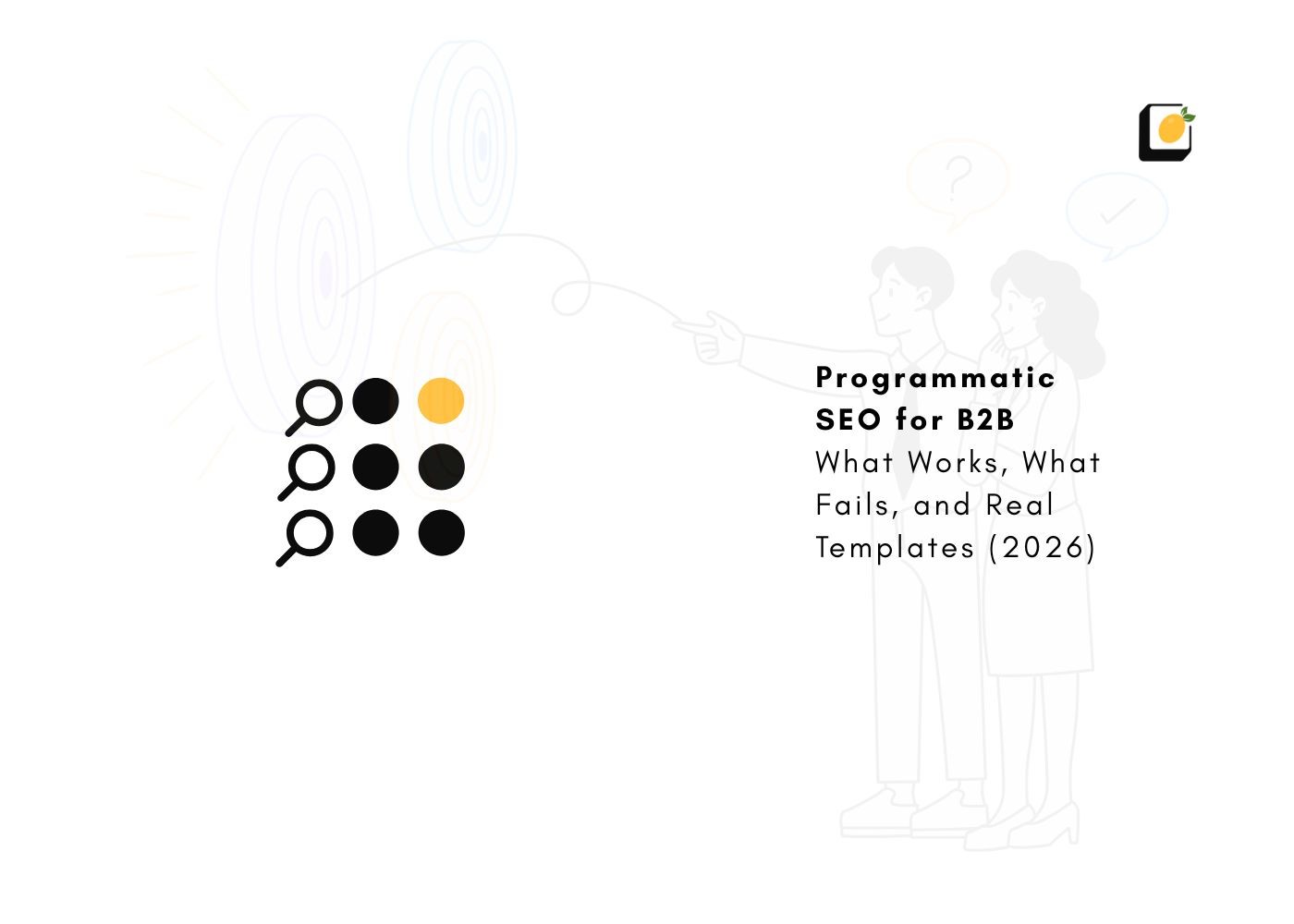AI-Friendly Schema Markup: Structured Data Strategies for Better GEO Visibility
July 28, 2025
Join 500+ brands growing with Passionfruit!
What This Article Is About
This is for marketers and SEO leads who need to untangle the chaos around structured data, AI search engines, and GEO visibility.
You’re not here for fluff. You want to know:
What kind of schema markup is worth implementing?
How do you actually make structured data work for local and AI-powered search?
And how do you know if it’s working at all?
We’re answering that.
We’re going deep into AI schema markup, what Google expects, how generative engines treat structured data, and how to turn it into real performance gains across locations.
Why Structured Data Matters for GEO SEO
GEO SEO means getting found across multiple cities, countries, or regions and doing that consistently. Keywords won’t get you far if the machines parsing your site can’t figure out what you do, who you serve, and where you operate.
That’s where structured data steps in.
When you implement schema markup, you’re making things explicitly clear for AI crawlers and search engines. You’re saying: “This is a product, this is our service area, and this is the local business.”
If your structured data is right:
Google is more likely to display your content in enhanced formats (rich results, sitelinks, FAQs).
Generative search engines like SGE, Bing AI, or even Gemini can cite you more accurately.
You get better indexation speed and context clarity.
And if it’s missing? You're invisible in the places you’re trying hardest to reach.
If you’re tired of guessing what Google wants from your GEO pages, book a schema audit with Passionfruit and see what you’re missing.
Can Structured Data Actually Improve AI Search Visibility?
Yes, and it's already happening.
AI-powered search engines like Google SGE, ChatGPT (with browsing), and Bing AI pull structured content to answer user queries. Unlike traditional search engines that rely heavily on backlinks and basic HTML scanning, these tools prioritize clean, machine-readable data.
If your page has well-defined structured data:
Your brand has a higher chance of being cited in generative results.
AI can “understand” the relationship between entities (services, products, locations) more clearly.
You’re more likely to surface in zero-click searches or be referenced by LLMs.
Here's an example:
Let’s say you run a SaaS that offers legal contract automation for startups in Berlin. A user asks ChatGPT, “What are the top contract automation tools for early-stage startups in Germany?”
Now, if your landing page has no Service, Organization, or LocalBusiness schema, the AI may skip you, because it has no way of confirming your business relevance to that region or niche. Schema is your handshake with the AI layer.
Which Schema Types Actually Impact GEO SEO?
Here’s a table that breaks down the essential schema types for anyone optimizing for multiple regions:
Schema Type | When to Use It | Why It Matters |
| For city or region-specific landing pages | Confirms physical or service-based presence |
| For homepage or about pages | Builds brand identity for AI engines |
| On services/products pages | Clarifies offerings by industry and region |
| On support pages or conversion-focused blog content | Boosts chances of SERP-rich snippets |
| For blogs, e-commerce, or SaaS platforms | Helps AI grasp site hierarchy and UX |
Not all schema types will apply to everyone. But at minimum, LocalBusiness and Organization should be on your core pages if you want GEO search performance.
Bonus: Using schema to denote language variations (via inLanguage) can also improve indexing and local relevance across regions.
How Do You Map Schema to Local Search Intent?
Local search isn’t just “insert city name in the H1.” That tactic hasn’t worked well in years.
Here’s what actually helps:
Analyze search console data by region.
Pay attention to location-specific queries (e.g., “tax filing software for freelancers in Toronto”).
Use tools like AlsoAsked, GA4 geographic segments, and entity-based clustering to find intent variations.
Once that data is in place:
Use the
Serviceschema to reflect localized offerings (e.g., different packages or pricing for US vs UK).Add
FAQ Pagemarkup that reflects region-specific concerns.Customize your
Local Businessschema to align with actual address, opening hours, currency, etc.
If users in Sydney are searching differently from those in Boston, your markup should mirror that, even if your CMS uses the same template.
This kind of intent mapping doesn’t scale manually. Our GEO playbooks at Passionfruit use AI insights to localize schema the smart way.
What Tools Actually Help You Validate and Monitor Structured Data?
It’s one thing to implement structured data, and another to know if it’s working.
Here are the tools that genuinely help (and don’t overwhelm you with dev-jargon):
Google Search Console
Use the Enhancements tab to spot errors in the schema (like missing fields or invalid nesting)
Track how many of your pages are eligible for rich results
Check the indexing status for pages with schema
Schema Markup Validator (schema.org)
This is the go-to for clean validation
Paste your URL or raw code, and it tells you if it passes or breaks
Rich Results Test
Shows you if your structured data qualifies for rich features in Google Search
Handy for
FAQPage,HowTo,Product, andReviewtypes
Screaming Frog (with custom extraction)
Not free, but super useful for site-wide audits
You can extract schema fields at scale and find inconsistencies
Looker Studio + GA4
Combine performance and location metrics
Track schema impact by building a dashboard filtered by GEO, impressions, CTR, and enhancement types
Not sure which of these tools fits your stack? We help clients build custom schema monitoring dashboards, built into your SEO analytics. Talk to us.
How Do You Keep Your Structured Data Aligned With Google’s SEO Guidelines?
Google’s own guidelines for structured data are clear (yet often ignored).
Here’s what matters most:
Use JSON-LD Format
Google prefers this format because it's cleaner and easier for their parsers to scan. Avoid Microdata unless you have no other option.
Don’t Fake Schema
If your page doesn’t have FAQs, don’t add FAQPage schema just to try and win rich snippets. That can actually get you penalized.
Follow Schema Vocabulary
Use only valid schema types and properties. You can’t just invent your own tags. And don’t mix unrelated schemas in the same JSON block. Keep it tidy.
Reflect Real Content
Whatever is marked up in the schema should also exist visibly on the page. No exceptions.
Use Schema To Support E-E-A-T
Want Google and generative engines to trust your content? Help them verify:
Who wrote it? (
authorschema)What credentials do they have? (
Person,Organization)What’s your source or review history? (
Review,Citation,Aggregate Rating)
This matters way more in the GEO+AI landscape, where trust signals can determine if your brand gets cited or skipped.
What Schema Metrics Should You Actually Track?
Traffic’s great, but schema is a technical lever. So your tracking has to get technical, too.
Here’s what’s worth watching:
Metric | Why It Matters |
Pages with Valid Schema | Baseline: Are you deploying the schema at all? |
Impressions with Rich Results | Tells you if the schema is helping you stand out |
Click-Through Rate on Rich Snippets | Higher CTR = better result design and intent match |
GEO Distribution of Clicks | Helps you assess if the schema is working in specific locations |
Average Ranking Position (Schema vs No-Schema) | Can help isolate the schema's role in performance |
Pro tip: Segment your performance by schema type, not just page. That’s where the real insights live.
What Common Mistakes Break Schema Performance?
Even if you’re adding structured data, these errors will quietly kill your performance, or worse, get your site flagged.
Using the Wrong Schema Type
Don’t force-fit Article on a services page. Or use Product for a pricing table. Use what actually fits the intent of the page.
Incomplete Fields
A half-baked schema (missing name, description, or URL) does more harm than good. Fill in all required properties and as many optional ones as possible.
Overloading Schema
Cramming multiple, unrelated schema blocks into one page confuses crawlers. Stick to relevant and minimal markup per page.
Not Updating Schema After Page Changes
Update your content, but forget to update the schema? Google notices. The schema should always match your current page content.
Forgetting Mobile & Dynamic Pages
If your mobile version or dynamic content doesn’t load schema properly, it’ll be ignored. Check both versions and audit accordingly.
GEO Schema Checklist: Are You Actually Ready?
Before you ship schema updates across your site, run this checklist:
Organizationschema on homepageLocalBusinessschema on each regional/city-specific pageFAQPageschema on support/help or sales pagesSchema matches actual visible content
JSON-LD format used (not Microdata)
Validated in Google’s tools
Pages show up in Enhancements in Search Console
GEO performance segmented in your analytics dashboard
Keep this tight. Don’t ship a messy schema across hundreds of pages. Fix one, test it, then scale it.
Conclusion
If you’ve made it this far, odds are you care about building a search strategy that actually scales. One that doesn’t collapse every time Google changes its mind or launches a new AI feature.
You don’t have to figure this all out alone.
Get in touch with the team at Passionfruit.
We build schema strategies that drive GEO traffic, brand citations, and AI search presence that’s measurable and real.
Or check out our other resources on:
Let’s help you rank where it counts, not just on Google, but on the next generation of search.
Key Takeaways
Structured data is the bridge between your content and AI search engines. Without it, you’re just noise.
If your schema isn’t region-specific, your GEO pages aren’t doing what they should.
Generative search engines rely on clean markup to understand and cite your brand.
Most schema fails because of small errors: wrong types, missing fields, or stale markup.
Schema isn’t an SEO add-on; it’s foundational for ranking in an AI-first world.
FAQs
Q: What’s the best schema type for local landing pages?
A: If you're targeting users in specific locations, the LocalBusiness schema is your best bet. It tells search engines that your service is tied to a specific area, whether you have a physical presence or serve customers in that city. Make sure to include properties like address, openingHours, geo, and areaServed. This schema signals regional relevance, which is critical for GEO SEO and for showing up in local packs or AI-curated recommendations for a given city.
Q: Does structured data improve AI search visibility?
A: Definitely. LLMs and AI-powered search platforms rely on structured data to understand the deeper context of your pages. Schema helps clarify what a page is about, what kind of service you provide, who you serve, and where you operate, all of which matter when AI engines decide whether your brand is a good match for a user query. Without this layer of markup, your pages can be ignored or misinterpreted by AI search features like Google's SGE, Gemini, or ChatGPT browsing plugins.
Q: Is it worth adding a schema even if I already rank well?
A: Yes. Ranking today doesn’t guarantee visibility tomorrow, especially as Google shifts toward AI-generated results and context-first indexing. Schema isn’t just about ranking higher; it’s about unlocking enhanced SERP features like FAQs, sitelinks, rich cards, and potentially even citations in SGE or Gemini. Adding structured data is also future-proofing: it makes your site easier for both humans and machines to interpret and trust. So even if your rankings are stable, schema helps make them stick.
Q: How do I test if my schema is implemented correctly?
A: The fastest way is through tools like Google’s Rich Results Test or the Schema Markup Validator. Just plug in your page URL or the raw schema code, and it’ll highlight what’s working and what needs fixing. These tools check for syntax errors, missing properties, invalid nesting, and compatibility with Google's enhancement types. Bonus: you’ll know if your page qualifies for features like rich results before Google actually rolls them out.
Q: Can I track how schema impacts my SEO in Search Console?
A: Absolutely. In Google Search Console, the “Enhancements” section shows which schema types Google detected, along with issues, validation status, and the number of valid pages. You can also use the Performance Report to segment pages by schema presence, impressions, CTR, and clicks. If you've added schema across GEO-specific pages, monitor those separately to identify what’s actually moving the needle regionally.

















